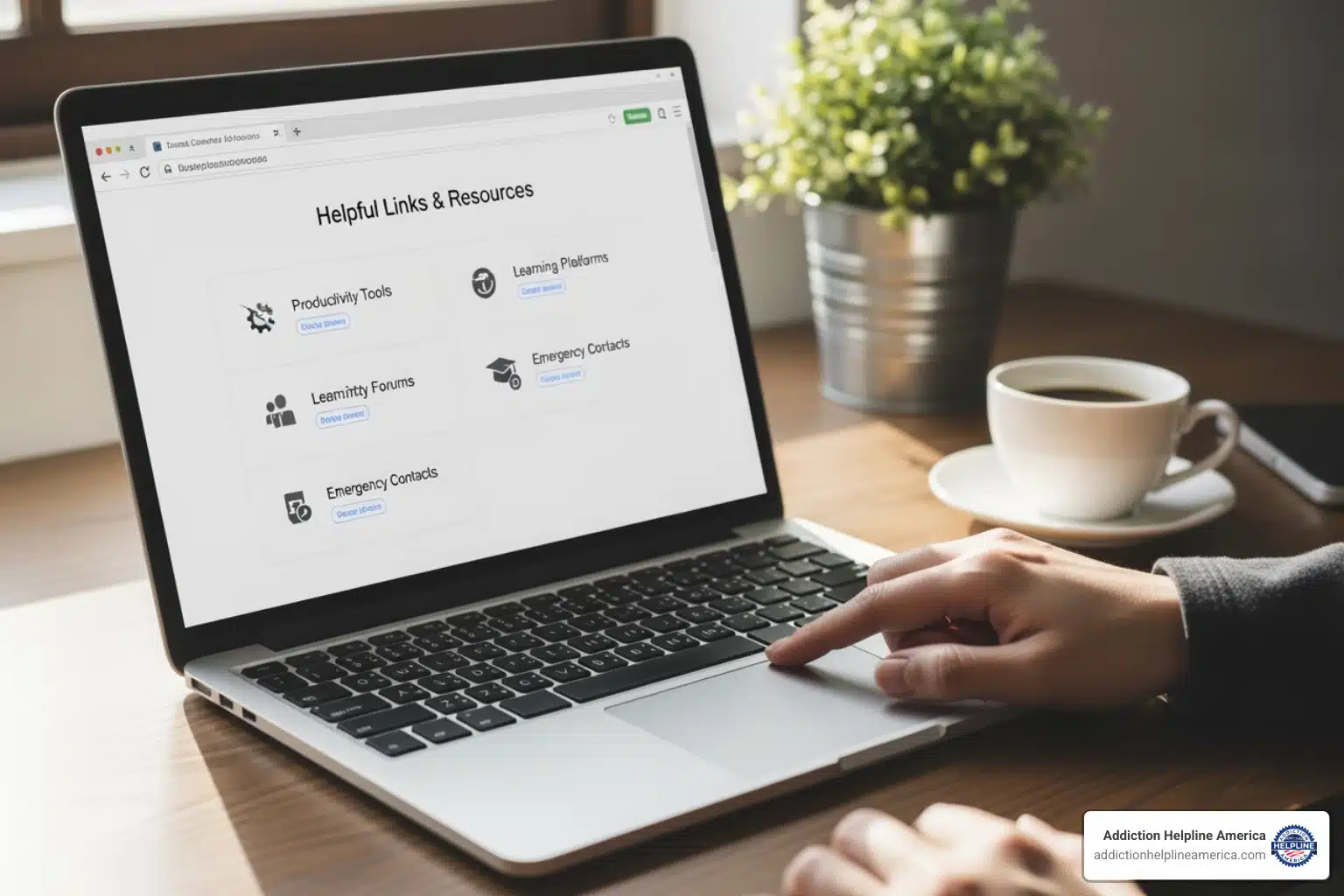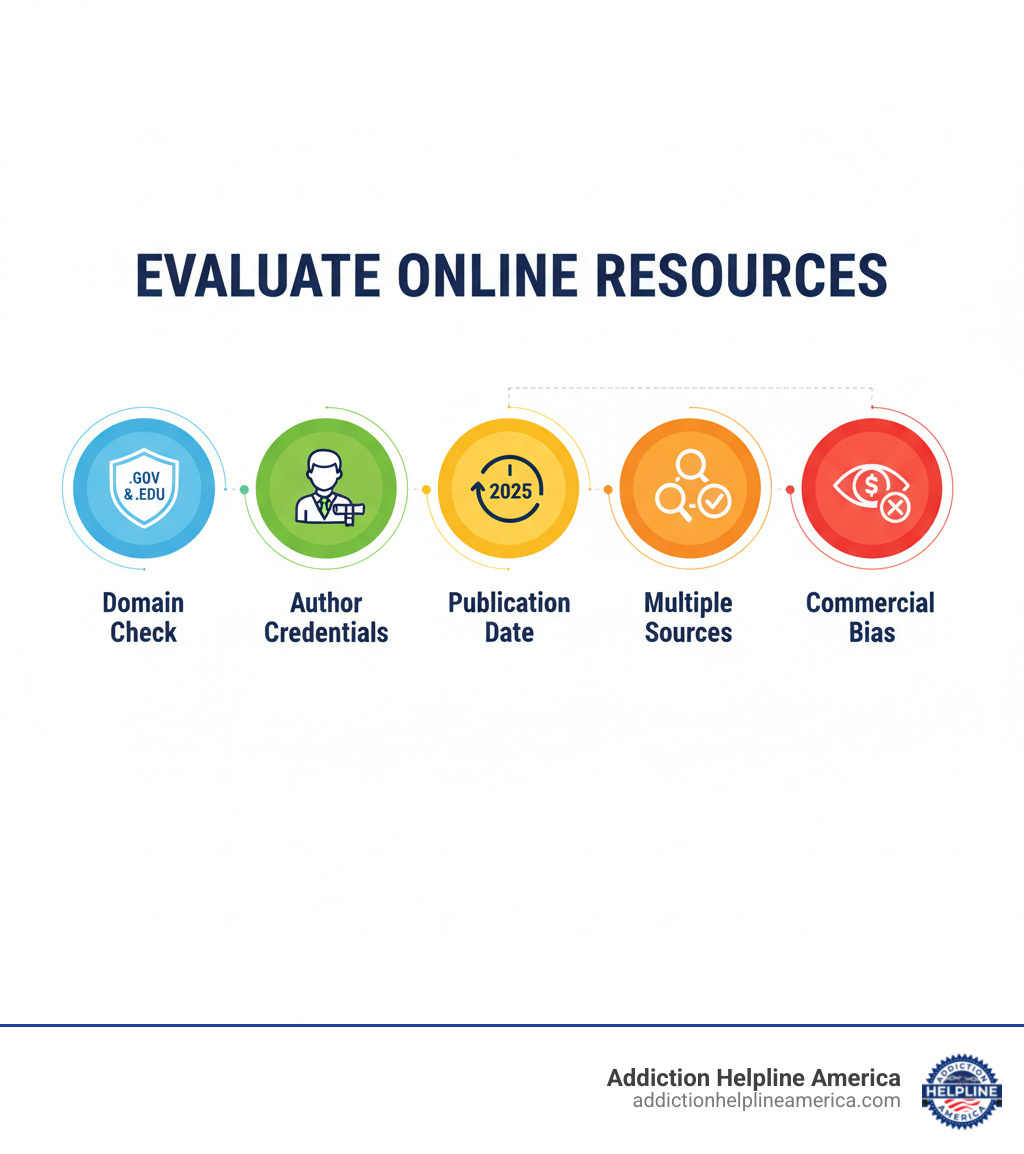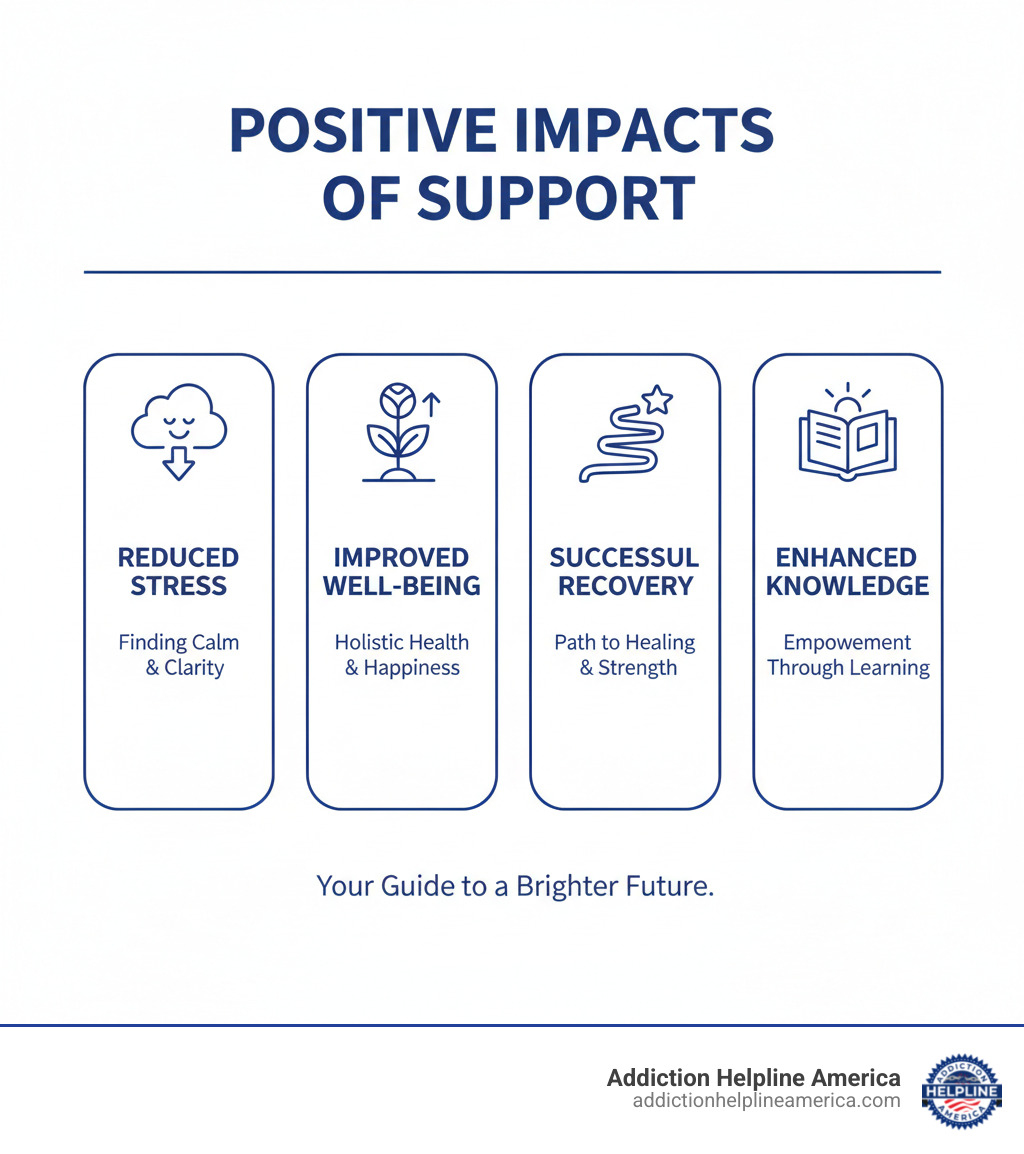
Why Finding the Right Support Matters When You’re Overwhelmed
Helpful Links and Resources are curated collections of trustworthy websites, organizations, and support services designed to connect you with the specific help you need—whether that’s addiction treatment, mental health support, financial assistance, educational guidance, or crisis intervention.
Quick Answer: What You’ll Find Here
| Resource Type | What It Offers | Who It Helps |
|---|---|---|
| Crisis Hotlines | 24/7 confidential support (211, Addiction Helpline) | Anyone needing immediate help |
| Government Agencies | Official information, benefits, services | General public seeking verified info |
| Treatment Referrals | Connections to local recovery programs | Individuals and families facing addiction |
| Educational Resources | Writing guides, career tools, research help | Students, job seekers, professionals |
| Community Support | Non-profits, support groups, peer networks | People seeking ongoing guidance |
When you’re facing addiction—whether personally or watching a loved one struggle—the internet can feel like an overwhelming maze of information. Where do you start? Which resources are legitimate? Who can you trust when time is critical and emotions are raw?
That’s why curated directories of helpful links exist. They cut through the noise to connect you with verified, expert resources quickly. Services like 211 made over 18 million referrals to help and resources in 2024 alone, connecting people to everything from housing assistance to addiction treatment programs. As one person who called 211 shared: “Just talking meant more than the resources… you provided more hope than I ever thought possible.”
At Addiction Helpline America, we’ve spent years building connections to a vast network of treatment programs and support services, understanding how critical it is to find trustworthy Helpful Links and Resources when someone is ready to take that first step toward recovery. We know that the right resource at the right moment can literally save a life.
Navigating Your Path to Support: General & Crisis Resources
Sometimes life hits hard and fast. Maybe you’re facing a crisis right now. Maybe you’re watching someone you love struggle. Or maybe you’re just trying to figure out where to turn when everything feels overwhelming.
That’s exactly why we’ve put together these Helpful Links and Resources—to be your starting point when you need help now.
When you need immediate, confidential help, one number can open doors to countless local services: 211. Think of it as a lifeline that connects you to the support services in your community—everything from mental health support to housing assistance to help with utility bills.
The 211 service reaches about 94.6% of people across all 50 states, the District of Columbia, and Puerto Rico. It’s free. It’s confidential. And it’s available 24/7, often in multiple languages. In 2024 alone, 211 made over 18 million referrals to people who needed help. More than 8.5 million of those were for housing, homelessness, and utility assistance.
One person who called 211 said something that stuck with us: “Just talking meant more than the resources… you provided more hope than I ever thought possible.”
If you or someone you care about is struggling with addiction, we know how isolating that journey can feel. At Addiction Helpline America, we’ve built our entire mission around making sure you don’t face it alone. We connect people to expert, caring help through our vast network of treatment centers. Our guidance is free, confidential, and personalized—because finding the right recovery program can make all the difference.
For caregivers facing their own unique challenges, there’s something we want you to hear: taking care of yourself isn’t selfish. It’s essential. Caregivers pour so much into others that they often forget their own needs. The Caregiver’s Handbook is a compassionate guide that walks you through getting started, finding support networks, managing daily challenges, and—most importantly—taking care of you. Because you can’t pour from an empty cup.
Whether you’re facing disaster recovery, need help with basic necessities, or are navigating the complex world of addiction treatment, these resources exist to lighten your load. You don’t have to figure everything out on your own. That’s what these Helpful Links and Resources are here for—to help you find your path forward, one step at a time.
Your Ultimate Guide to Helpful Links and Resources
When you’re searching for help online, you need more than just a list of websites—you need to know you can trust what you find. That’s why we put every resource through a careful vetting process before including it in our collection of Helpful Links and Resources.
We look for websites with official government (.gov) or educational (.edu) domains, because these tend to be the most reliable. We also seek out respected non-profit organizations and content that experts regularly review and update. Authority matters. Accuracy matters. And knowing when information was last updated matters too—especially when you’re dealing with something as important as your health or recovery.
But here’s the thing: the internet changes fast. A link that worked yesterday might be broken today. A program that was accepting new clients last month might have updated its services. That’s why we’re constantly reviewing these resources—daily for crisis lines where every second counts, and quarterly for more general information.
We also know we can’t do this alone. You’re out there using these resources every day, and your experience matters. If you find a broken link, please tell us. If you find an amazing resource that helped you or someone you love, we want to hear about it. Your suggestions help us keep this directory current and truly useful for everyone who needs it.
Government & Federal Agency Resources
When you need official information you can count on, government websites are usually your best bet. These aren’t sites trying to sell you something or push an agenda—they’re designed to serve the public and provide accurate, verified information straight from the source.
If you’re navigating college or vocational education, the U.S. Department of Education’s Federal Student Aid website is essential. It’s the official place to learn about federal grants, loans, and work-study programs. No guesswork, no middlemen—just clear guidance on what’s available and how to apply: Federal Student Aid website.
Beyond education, several other federal agencies offer specialized Helpful Links and Resources that might be exactly what you need. The Centers for Disease Control and Prevention (CDC) provides crucial health information, disease prevention guidelines, and safety recommendations. They even offer materials in multiple languages and run specialized programs like the Import Permit Program for biological materials through their Division of Regulatory Science and Compliance.
The National Institutes of Health (NIH) leads the nation’s medical research efforts, offering resources on countless health conditions and ongoing studies. Their National Institute of Allergy and Infectious Diseases (NIAID) is particularly helpful for understanding infectious diseases and immune system disorders.
If you’re concerned about workplace safety, the Occupational Safety and Health Administration (OSHA) sets and enforces standards to protect workers. Their website offers training materials, safety guidelines, and assistance for both employers and employees.
The Federal Bureau of Investigation (FBI) provides more than just law enforcement—they offer public resources through divisions like the Criminal Justice Information Services Division and the Weapons of Mass Destruction Directorate, which help keep communities informed about safety and security issues.
Other agencies like the Department of Commerce, Department of Homeland Security, and Department of Transportation each offer their own specialized resources, from economic development programs to infrastructure safety information.
These official sources give you verified information directly from the people who create policies and run programs. No rumors, no misinformation—just facts you can rely on when making important decisions.
Educational & Career Development: Helpful Links and Resources for Growth
Learning never really stops, does it? Whether you’re writing your first college paper, updating your resume after years in the same job, or completely reinventing your career, having the right guidance makes all the difference.
For anything related to writing and research, the Purdue Online Writing Lab (OWL) is like having an expert writing tutor available 24/7. Students and professionals around the world turn to this free resource for help with writing skills, citation styles like APA and MLA, and research methods. The OWL teaches you how to conduct research, use primary and secondary sources, evaluate what you find online, and—crucially—avoid plagiarism. You can explore their main site, dive into their research and citation resources, learn more about the OWL, or watch their helpful video tutorials.
Career transitions can feel overwhelming. Where do you even start? CareerOneStop, sponsored by the U.S. Department of Labor, offers step-by-step “How-to Guides” that break down the process into manageable pieces. These guides cover everything from finding career ideas and building resumes to recovering after a layoff or finding employment after incarceration. You work at your own pace, following clear instructions designed for real-world situations: CareerOneStop How-to Guides.
These Helpful Links and Resources aren’t just informational—they’re practical tools that empower you to take concrete steps toward your goals. Whether you’re trying to improve your writing, land a new job, or switch careers entirely, these resources meet you where you are and help you move forward.
Non-Profit & Community Support: More Helpful Links and Resources
Sometimes the most powerful support doesn’t come from government agencies or educational institutions—it comes from people who truly understand what you’re going through. Non-profit organizations and community groups create spaces where you can find both practical help and emotional support.
We know how addiction affects entire families, not just the person struggling with substance use. That’s why we’re committed to connecting families with support systems like Al-Anon, where loved ones can share their experiences, learn from others facing similar challenges, and find strength in community. These support groups offer something irreplaceable: understanding from people who’ve walked the same path. Find support for families dealing with addiction through our dedicated resources.
Beyond addiction support, several other organizations offer unique ways to connect and grow. StoryCorps preserves and shares stories from everyday people—real conversations about love, loss, hope, and resilience. Listening to these interviews at storycorps.org can help you feel less alone while also offering authentic examples of how people communicate and connect.
The Moth takes storytelling to the stage, featuring true stories told live without notes. These authentic narratives at themoth.org remind us that everyone has a story worth telling, and hearing others’ experiences can be both inspiring and comforting.
This I Believe invites people to share personal essays about the core values that guide their lives. Reading or listening to these reflections at thisibelieve.org can spark your own self-reflection and help you understand perspectives different from your own.
These community resources offer something that facts and figures can’t: human connection. They remind us that we’re not alone in our struggles, our hopes, or our journey toward growth and healing. That sense of shared humanity is often exactly what we need to keep moving forward.
Mastering Personal & Professional Growth
Growth doesn’t happen by accident—it happens when you actively seek out knowledge, practice new skills, and open yourself to fresh perspectives. That’s what this collection of Helpful Links and Resources is all about: giving you practical tools to become a better communicator, a more confident speaker, and a lifelong learner who never stops evolving.
Whether you’re working on your career, supporting someone through recovery, or simply trying to communicate more clearly, the resources in this section can help you build the skills that matter most in real life.
Lifelong Learning and Skill Improvement
Sometimes the best way to learn something new is to hear someone passionate explain it in plain language. That’s the magic of TED Talks—short, powerful presentations that tackle everything from science breakthroughs to personal change stories. Each talk comes with interactive transcripts, which means you can read along, revisit key points, or even use them to improve your language skills. These aren’t dry lectures; they’re inspiring conversations that stick with you long after you finish watching. You can dive into thousands of these talks at the collection of educational talks.
If you’re curious about how to distill complex ideas into clear, compelling messages, check out The 3-Minute Thesis Competition from the University of Queensland. Graduate students present years of research in just three minutes—no jargon, no slides full of text, just clarity and passion. Watching these presentations is like getting a masterclass in communication. It’s especially valuable if you’re working on presentation skills or academic English. You can find examples of these presentations at The 3-Minute Thesis Competition.
These resources support your journey not just by providing information, but by showing you what effective communication actually looks like in action. That’s the kind of learning that sticks.
Improving Communication and Pronunciation
Clear communication opens doors—in job interviews, in relationships, in recovery conversations, and in everyday life. For anyone working to improve their English pronunciation or speaking confidence, we’ve gathered some genuinely helpful Helpful Links and Resources that make the process less intimidating and more effective.
Rachel’s English is a standout resource, offering hundreds of videos that break down English pronunciation in a way that actually makes sense. Rachel teaches you about vowel sounds, consonant sounds, and the rhythm and intonation patterns that make English flow naturally. Her approach is patient and detailed, perfect for anyone serious about speaking more clearly. Visit Rachel’s English tutorial site to explore her comprehensive lessons.
ElementalEnglish.com takes a similar approach with clearly explained video and audio lessons that focus on both pronunciation and grammar. The visual aids help you see exactly how sounds are formed, which can be a game-changer when you’re trying to master tricky pronunciation patterns. You can find their resources at ElementalEnglish.com.
For something more interactive, English Accent Coach offers research-based games that train your ear to recognize different consonant and vowel sounds. Active listening is one of the best ways to improve pronunciation, and this site makes it engaging rather than tedious. Check it out at English Accent Coach.
If you prefer learning through current events and real conversations, BBC 6 Minute English delivers topical discussions and fresh vocabulary in bite-sized episodes. It’s been running for years and remains one of the most reliable ways to improve your English while staying informed. Find it at BBC 6 Minute English.
VOA Learning English offers a multimedia approach with news and information custom to different proficiency levels. It’s excellent for practicing listening comprehension and reading, and many learners use it for “shadowing”—repeating what they hear to improve pronunciation and fluency. Visit VOA Learning English to explore their extensive content.
For video-based learning with modern, updated content, English Central helps you improve speaking clarity, listening skills, reading comprehension, and vocabulary all in one place. Their approach is practical and keeps pace with how English is actually used today. Find them at English Central.
Ever been unsure how to pronounce someone’s name correctly? It matters more than you might think—getting someone’s name right shows respect and builds connection. Hear Names lets you type in a name and hear it pronounced correctly at Hear Names. Even better, Namez allows people to record and share the correct pronunciation of their own names, which is incredibly helpful in our diverse, connected world. You can find it at Namez.
Finally, artificial intelligence is changing how we learn languages. Artificial Intelligence Tools in the ESL Classroom explores practical ways to use AI to boost language learning across all skills—reading, writing, listening, and speaking. If you’re curious about how technology can accelerate your progress, this resource offers concrete ideas and suggested tools. Read more at Artificial Intelligence Tools in the ESL Classroom.
At Addiction Helpline America, we know that communication skills matter deeply in recovery. Whether you’re learning to express your needs clearly, supporting a loved one through difficult conversations, or rebuilding confidence after addiction, these Helpful Links and Resources can help you find your voice and use it powerfully.
Frequently Asked Questions about Finding and Using Online Resources
Even with a carefully organized collection in front of you, questions naturally come up. That’s completely normal! We want you to feel confident as you steer these Helpful Links and Resources, so let’s address the questions we hear most often.
What makes a resource “helpful” or trustworthy?
This might be the most important question you can ask, especially when you’re searching for support during a difficult time. A truly helpful resource does more than just exist on the internet—it directly addresses what you need with clear, actionable information you can use right away.
Trustworthiness is something we take seriously when building this collection. Authority matters: we look for information from recognized experts, established institutions, and official bodies with real credentials. That’s why you’ll notice many resources here come from .gov (government) or .edu (educational) domains, which are generally more reliable than commercial sites for unbiased information. Reputable .org sites from established non-profits also make the cut.
Accuracy is non-negotiable. We look for information that’s fact-checked, supported by research, and presented without sensationalism or scare tactics. The resource should be objective—free from hidden agendas or heavy commercial bias. Yes, some sites (including ours at Addiction Helpline America) offer services, but the informational content itself should be balanced and focused on helping you, not selling to you.
We also check how current the information is. A “last updated” date might seem like a small detail, but it tells you whether you’re reading today’s guidance or yesterday’s news. And finally, transparency counts: Does the site clearly explain its mission, how it’s funded, and who creates the content? These details help you understand what you’re reading and why.
Every external resource in our Helpful Links and Resources collection has been carefully vetted using these criteria. We want you to feel safe clicking any link we share.
How are these links kept up-to-date?
A list of resources is only helpful if it actually works when you need it. We’ve built a system to keep everything current and functional.
We conduct regular reviews on a schedule—checking every link for broken URLs, outdated information, or changes in what an organization offers. Some resources get checked daily (like crisis lines), while others are reviewed quarterly. We also use automated link checkers that scan for technical problems, alerting us immediately when something breaks so we can fix it fast.
But honestly? Your feedback is one of our most valuable tools. You’re using these resources in real time, and you’ll often spot issues before we do. If you click a link that doesn’t work, or you find information that seems outdated or no longer relevant, please let us know. We genuinely rely on our community to help us maintain quality.
We also stay informed about developments in mental health, addiction treatment, education, and government services. When a new, reputable resource emerges that could help people, we evaluate it and add it to the collection. This isn’t a “set it and forget it” list—it’s a living, breathing directory that evolves with your needs.
How can I find resources for a specific need, like addiction or family support?
We’ve organized everything to make your search as straightforward as possible. Start by scanning the section headings in this article. We’ve grouped resources into clear categories: Government & Federal Agency Resources, Educational & Career Development, and Non-Profit & Community Support. Find the category that matches your general need and start there.
For addiction and mental health treatment specifically, you don’t need to steer alone—that’s exactly what we’re here for at Addiction Helpline America. We offer free, confidential, personalized guidance to connect you with the right recovery program from our extensive network. You can reach out to us directly, talk through your situation, and receive referrals custom to your specific circumstances. Sometimes the best resource is a real person who understands what you’re going through.
Within each category, you’ll find specific links for focused needs. For example, if you’re looking for family support around addiction, check the Non-Profit & Community Support section where you’ll find connections to programs like Al-Anon.
You can also use your browser’s search function (press Ctrl+F on Windows or Cmd+F on Mac) to look for specific keywords throughout the article—try searching for terms like “housing,” “caregiver,” “resume,” or “pronunciation” to jump directly to relevant resources.
And remember, for immediate assistance, services like 211 connect you to local social services right away. For mental health and addiction crises, we can connect you with specialized helplines that provide 24/7 support. The right help is out there, and we’re committed to helping you find it without unnecessary barriers or confusion.
Conclusion
Finding the right support when you need it most shouldn’t feel like searching for a needle in a haystack. Throughout this guide, we’ve walked together through a carefully curated collection of Helpful Links and Resources—each one chosen because it offers real help, trustworthy information, and a genuine path forward.
Whether you’re facing addiction, supporting a loved one through recovery, advancing your education, or simply trying to steer life’s unexpected challenges, the right resource at the right moment can change everything. We’ve seen it happen countless times. A single phone call. One helpful website. The right support group. These connections have the power to shift someone’s entire trajectory.
That’s why we’re so committed to keeping this collection current, reliable, and genuinely useful. We regularly review every link, listen to your feedback, and add new resources as they emerge. This isn’t just a static list—it’s a living guide that evolves to meet your needs.
At Addiction Helpline America, we understand deeply that addiction doesn’t just affect one person. It ripples through entire families, creating waves of worry, confusion, and heartache. That’s why our mission extends beyond connecting individuals to treatment—we’re here to support everyone touched by addiction. Our free, confidential service provides personalized guidance to find the right recovery program from our vast network of treatment centers. You don’t have to figure this out alone.
For families carrying the weight of a loved one’s addiction, finding community and understanding is just as important as treatment itself. Programs like Al-Anon offer that safe space where families can share their experiences, learn from others who truly understand, and find their own path to healing. Recovery isn’t just for the person struggling with addiction—it’s for everyone affected by it. Find support for families dealing with addiction and take that first step toward your own healing journey.
We hope these Helpful Links and Resources become your trusted companion as you steer whatever challenges come your way. Your journey matters. Your recovery matters. Your family’s healing matters. And we’re honored to walk alongside you, connecting you to the expert, caring help you deserve. A brighter future is possible, and it starts with knowing where to turn for help.
Our helpline is 100%
free & confidential
If you or someone you care about is struggling with drug or alcohol addiction, we can help you explore your recovery options. Don’t face this challenge alone—seek support from us.
Programs
Resources
Will my insurance
cover addiction
treatment?
We're ready to help
Find the best
drug or alcohol treatment
center
Are you or a loved one struggling with addiction? Call today to speak to a treatment expert.

















